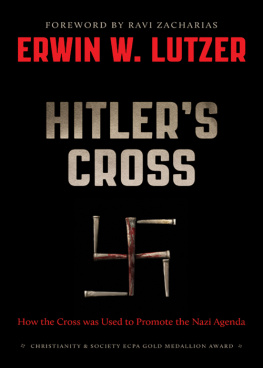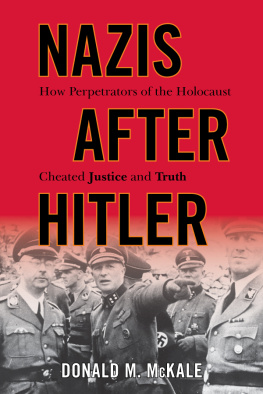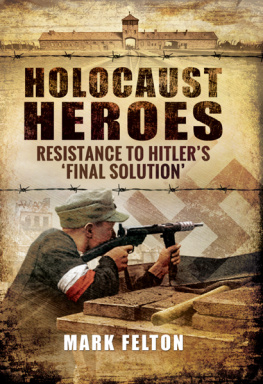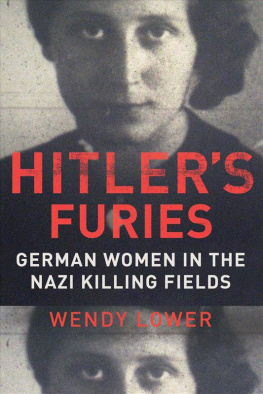HITLERS
SHADOW
WAR
ALSO BY DONALD M. MCKALE
War by Revolution: Germany and Great Britain in the Middle East in the Era of World War I
Rewriting History: The Original and Revised World War II Diaries of Curt Prfer, Nazi Diplomat
Curt Prfer: German Diplomat from the Kaiser to Hitler
Hitler: The Survival Myth
The Swastika outside Germany
The Nazi Party Courts: Hitlers Management of Conflict in His Movement, 19211945
HITLERS
SHADOW
WAR
THE HOLOCAUST AND WORLD WAR II
DONALD M. McKALE

Copyright 2002 by Donald M. McKale
First paperback edition 2006
All images courtesy of the U.S. Holocaust Memorial Museum Photo Archives.
All rights reserved. No part of this book may be reproduced in any form or by any electronic or mechanical means, including information storage and retrieval systems, without written permission from the publisher, except by a reviewer who may quote passages in a review.
Published by Taylor Trade Publishing
An imprint of The Rowman & Littlefield Publishing Group, Inc.
4501 Forbes Boulevard, Suite 200, Lanham, Maryland 20706
Distributed by NATIONAL BOOK NETWORK
The Library of Congress has cataloged the hardcover edition of this book as follows:
Hitlers shadow war : the Holocaust and World War II / Donald M. McKale.1st ed.
p. cm.
Includes index.
1. JewsGermanyHistory19331945. 2. JewsPersecutionsGermany. 3. AntisemitismGermanyHistory20th Century. 4. Holocaust, Jewish (19391945). 5. GermanyHistory19331945. 6. GermanyEthnic relations. I. Title: Holocaust and World War II. II. Title.
DS135.G3315 M43 2002
943.004924dc21
2002002084
ISBN-13: 978-0-8154-1211-3 (cloth : alk. paper)
ISBN-13: 978-1-58979-294-4 (pbk. : alk. paper)
ISBN-10: 0-8154-1211-8 (cloth : alk. paper)
ISBN-10: 1-58979-294-7 (pbk. : alk. paper)
 The paper used in this publication meets the minimum requirements of American National Standard for Information SciencesPermanence of Paper for Printed Library Materials, ANSI/NISO Z39.481992.
The paper used in this publication meets the minimum requirements of American National Standard for Information SciencesPermanence of Paper for Printed Library Materials, ANSI/NISO Z39.481992.
Manufactured in the United States of America.
FOR JANNA
CONTENTS
PREFACE
THIS BOOK SURVEYS the history of the Holocaust in World War II. I have attempted to show how the concept of racial war had an overwhelming influence on Adolf Hitlers thinking and actions, both before and during the war, and how, in his view, the Holocaust and the war were closely connected. Hopefully this will provide readers with a greater understanding of both the Holocaust and the war, and why and how each happened. Often histories of both events treat them separately or as barely related.
The intended audience for the book is the general reader or nonspecialist, including the college and university student. Since most general readers will not find them crucial and specialists on the Holocaust will not need them, endnotes have been kept to a minimum. Normally only direct quotations from original documents or from works of other writers receive a citation.
There are numerous scholars whose studies I have used or from whom I have learned much at professional meetings and discussions over the years about the Holocaust and Nazi Germany. Some of their work is cited in the notes and reading list at the end of this study.
For much of my inspiration to write this book, I wish to thank the numerous students who have enrolled in my college and university classes during the past thirty years. Based on their interest in and my discussions with many of them about the Holocaust and World War II, I have tried in the following pages to address their most frequent questions as well as those of other nonspecialists.
I am very grateful for the financial and other support for this book from Clemson University, where I have taught since 1979, and from the Class of 1941 Memorial Endowment. The latter was made possible by a generous gift to the university from its Class of 1941, in memory of fifty-seven of its members who died in World War II. Similar to most other young men of their generation, the vast majority of the class were destined for duty in the war and served their nation with extraordinary bravery and distinction. I am most appreciative of the support for my work from class members R. Roy Pearce, P. W. McAlister, Richard B. Caughman, and the late H. Betts Wilson.
I owe the greatest appreciation and thank you to my wife Janna, a wonderful and lovely person to whom this book is dedicated and without whose assistance, patience, and encouragement it would not have been completed.
Donald M. McKale
February 2002
ABBREVIATIONS AND
SPECIAL TERMS
AJC | American Jewish Congress |
Aktion | Literally action; a euphemism used by the Nazis to describe terror operations of the Germans and their foreign collaborators that included the roundup, mass shootings, and/or deportations of Jews. |
Armya Krajowa | Polish underground army |
Aryanization | Nazi term for the German takeover of Jewish property |
BBC | British Broadcasting Corporation |
Bund | Jewish Workers or Socialist party |
deportation | Mass roundup and transport by SS and German police of primarily Jewsbut also occasionally of other peoples such as Gypsiesfrom Germany and much of the rest of Europe to death camps or other facilities in the East where they were murdered. |
DP | Displaced Person; a description of the millions of refugees or deportees at the end of World War II, who found themselves displaced as a result of the war and usually unable to return to their homes. |
Einsatzgruppen | Mobile and armed formations of primarily SS and German police; used to hunt down and kill Jews and other perceived enemies in the territories conquered by Nazi Germany. |
ERR | Einsatzstab Reichsleiter Rosenberg; special staff of Reich leader Alfred Rosenberg; a German agency that specialized in plundering art treasures of Jews and others in the German-occupied countries of Europe. |
Euthanasia | Term used by the Nazis as a euphemism to disguise their murder of the handicapped during World War II. |
Final Solution | Endlsung, from the Nazi phrase Final Solution of the Jewish question; a euphemism for the program developed during 1941 to exterminate the Jews of Europe. |
FPO | Fareinikte Partisaner Organisatzije, United Partisan Organization; the principal anti-Nazi resistance organization in the Vilna ghetto. |
genocide | A term first used by Raphael Lemkin, a refugee Polish-Jewish lawyer in the United States, in late 1942 or early 1943 to describe the deliberate and systematic destruction of an ethnic or national group. At the time, the word referred directly to Nazi racial policies then being carried out. The word appeared in the indictments of German officers in postwar trials of war criminals. In 1948 the United Nations adopted the Genocide Convention, which made genocide a crime in international law. It explicitly bans killing, causing grievous bodily or spiritual harm, preventing births, or transferring children from a targeted group to some other group with genocidal intent. According to |







 The paper used in this publication meets the minimum requirements of American National Standard for Information SciencesPermanence of Paper for Printed Library Materials, ANSI/NISO Z39.481992.
The paper used in this publication meets the minimum requirements of American National Standard for Information SciencesPermanence of Paper for Printed Library Materials, ANSI/NISO Z39.481992.